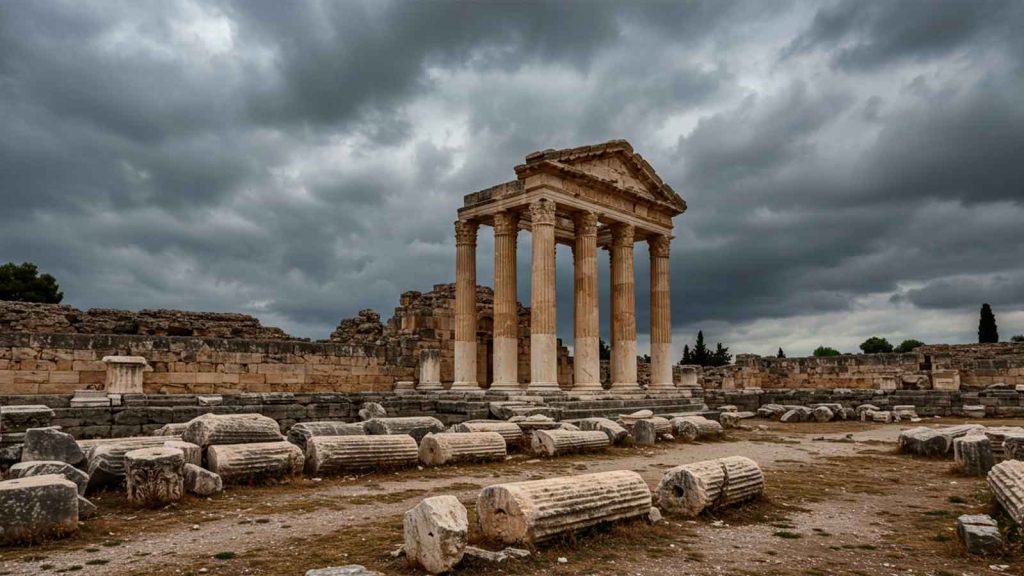Psalm 74 is a powerful prayer of supplication in the face of destruction and God’s apparent silence. From the opening verses we hear a cry for restoration, justice, and divine intervention. Written in a time of deep national affliction, this biblical passage invites us to reflect on the role of faith when everything seems lost.
Throughout this article we will explore the meanings, messages, and practical applications of Psalm 74, highlighting its central themes and its relevance today.
Psalm 74 in Full
¹ O God, why hast thou cast us off for ever? Why doth thine anger smoke against the sheep of thy pasture?
² Remember thy congregation, which thou hast purchased of old; the tribe of thine inheritance, which thou hast redeemed; this mount Zion, wherein thou hast dwelt.
³ Lift up thy feet unto the perpetual desolations; even all that the enemy hath done wickedly in the sanctuary.
⁴ Thine adversaries roar in the midst of thy holy places; they set up their ensigns for signs.
⁵ A man was famous according as he had lifted up axes upon the thick trees;
⁶ But now they break down all the carved work thereof at once with axes and hammers.
⁷ They have cast fire into thy sanctuary; they have profaned the dwelling place of thy name, casting it to the ground.
⁸ They said in their hearts, Let us destroy them altogether: they have burned up all the houses of God in the land.
⁹ We see not our signs; there is no more any prophet; neither is there among us any that knoweth how long.
¹⁰ O God, how long shall the adversary reproach? Shall the enemy blaspheme thy name for ever?
¹¹ Why withdrawest thou thy hand, even thy right hand? Pluck it out of thy bosom.
¹² Yet God is my King of old, working salvation in the midst of the earth.
¹³ Thou didst divide the sea by thy strength: thou brakest the heads of the dragons in the waters.
¹⁴ Thou brakest the heads of leviathan in pieces, and gavest him to be meat to the people inhabiting the wilderness.
¹⁵ Thou didst cleave the fountain and the flood: thou driedst up mighty rivers.
¹⁶ The day is thine, the night also is thine: thou hast prepared the light and the sun.
¹⁷ Thou hast set all the borders of the earth: thou hast made summer and winter.
¹⁸ Remember this, that the enemy hath reproached, O Lord, and that a foolish people hath blasphemed thy name.
¹⁹ O deliver not the soul of thy turtledove unto the wild beast: forget not the life of thy poor for ever.
²⁰ Have respect unto the covenant: for the dark places of the earth are full of the habitations of cruelty.
²¹ Oh let not the oppressed return ashamed: let the poor and needy praise thy name.
²² Arise, O God, plead thine own cause: remember how the foolish man reproacheth thee daily.
²³ Forget not the voice of thine enemies: the tumult of those that rise up against thee increaseth continually.
Psalm 74 Explained – Verse by Verse
Psalm 74:1
O God, why hast thou cast us off for ever? Why doth thine anger smoke against the sheep of thy pasture?
The psalmist expresses a sense of abandonment by God. He wonders why God is angry with His people, described as sheep—fragile and dependent on their shepherd.
Psalm 74:2
Remember thy congregation, which thou hast purchased of old; the tribe of thine inheritance, which thou hast redeemed; this mount Zion, wherein thou hast dwelt.
An appeal for God to recall His covenant with Israel, stressing that He chose and redeemed them. Zion represents the place of divine dwelling and communion with the people.
Psalm 74:3
Lift up thy feet unto the perpetual desolations; even all that the enemy hath done wickedly in the sanctuary.
The psalmist begs God to rise and behold the continual destruction the enemies have wrought upon the temple, the sacred place of worship.
Psalm 74:4
Thine adversaries roar in the midst of thy holy places; they set up their ensigns for signs.
The foes have profaned the sanctuary, shouting and setting up their own symbols as if they owned the holy place.
Psalm 74:5
A man was famous according as he had lifted up axes upon the thick trees.
The destruction is likened to felling a forest. The enemies are portrayed as barbarians violently demolishing something precious.
Psalm 74:6
But now they break down all the carved work thereof at once with axes and hammers.
They have no respect for sacred craftsmanship—everything carefully made is now brutally smashed with heavy tools.
Psalm 74:7
They have cast fire into thy sanctuary; they have profaned the dwelling place of thy name, casting it to the ground.
The invaders burned the temple and destroyed the place where God’s name was invoked, showing total disrespect and blasphemy.
Psalm 74:8
They said in their hearts, Let us destroy them altogether: they have burned up all the houses of God in the land.
The enemies intended to wipe out Israel’s faith entirely by destroying every place of worship and manifestation of the divine presence.
Psalm 74:9
We see not our signs; there is no more any prophet; neither is there among us any that knoweth how long.
The people are spiritually disoriented. There are no more signs from God, nor prophets to bring direction or hope.
Psalm 74:10
O God, how long shall the adversary reproach? Shall the enemy blaspheme thy name for ever?
This question reveals the psalmist’s anguish: how long will God allow His name to be mocked?
Psalm 74:11
Why withdrawest thou thy hand, even thy right hand? Pluck it out of thy bosom.
He cries for God to act, like a warrior drawing his hand from his chest to fight. The absence of divine action is painfully felt.
Psalm 74:12
Yet God is my King of old, working salvation in the midst of the earth.
Despite everything, the psalmist reaffirms his faith: God has always been King and has accomplished many acts of salvation.
Psalm 74:13
Thou didst divide the sea by thy strength: thou brakest the heads of the dragons in the waters.
This recalls the Exodus, when God parted the sea for Israel and overthrew their foes. The “dragons” symbolize chaotic forces defeated by God.
Psalm 74:14
Thou brakest the heads of leviathan in pieces, and gavest him to be meat to the people inhabiting the wilderness.
Leviathan represents a symbolic sea monster of evil. God utterly defeated it and even turns that victory into provision.
Psalm 74:15
Thou didst cleave the fountain and the flood: thou driedst up mighty rivers.
The psalmist recalls God’s power over the waters—a symbol of chaos—that He easily controls.
Psalm 74:16
The day is thine, the night also is thine: thou hast prepared the light and the sun.
Here God is exalted as Creator. Day and night are the work of His hands.
Psalm 74:17
Thou hast set all the borders of the earth: thou hast made summer and winter.
Beyond light, God created the seasons and the boundaries of the world. He is Lord of order and creation.
Psalm 74:18
Remember this, that the enemy hath reproached, O Lord, and that a foolish people hath blasphemed thy name.
Another plea for God to remember the blasphemies spoken against Him and His people.
Psalm 74:19
O deliver not the soul of thy turtledove unto the wild beast: forget not the life of thy poor for ever.
The “turtledove” represents God’s people—fragile, persecuted. The psalmist asks for compassion and protection.
Psalm 74:20
Have respect unto the covenant: for the dark places of the earth are full of the habitations of cruelty.
This is an appeal to the covenant. The world is overrun by injustice, and the psalmist asks God to act in faithfulness to His promise.
Psalm 74:21
Oh let not the oppressed return ashamed: let the poor and needy praise thy name.
May the humble and afflicted experience deliverance and have reason to praise God without shame.
Psalm 74:22
Arise, O God, plead thine own cause: remember how the foolish man reproacheth thee daily.
The psalmist calls God to act for His own name and honor, since He is being insulted daily.
Psalm 74:23
Forget not the voice of thine enemies: the tumult of those that rise up against thee increaseth continually.
The final verse reinforces the urgent cry: the noise of opposition to God keeps growing, and He must intervene.

The Historical Context of Psalm 74
Psalm 74 is attributed to Asaph or his line of musicians and prophets. It was likely composed after the destruction of the Temple in Jerusalem, at a time of great national sorrow. The people of Israel were desolate before the invading enemy, and the absence of divine intervention was interpreted as abandonment.
This collective lament represents more than grief over a physical temple—it is a spiritual cry for redemption. The prayer reveals the pain of a people who miss God’s presence and long ardently to be remembered by Him.
Structure and Central Themes of Psalm 74
Psalm 74 can be divided into four major movements:
Cry for Divine Help
The psalmist begins by recalling that God is Israel’s shepherd and asking Him not to reject His people forever. This section expresses the tension between faith in the covenant and the reality of present suffering.
Description of the Temple’s Destruction
One of the most vivid moments in Psalm 74 is the author’s description of the damage done to the sanctuary. The enemies tore everything down, burned the sacred sites, and profaned God’s name.
Appeal to the Remembrance of God’s Former Works
Despite the chaos, the psalmist recalls great deeds of the past—creation, victory over the sea, the opening of springs. He resorts to history to renew hope.
Plea for Justice
The psalm ends with a firm appeal for justice: that God intervene against the adversaries and remember His humiliated people. It is a plea that mixes faith with indignation.
Spiritual Lessons from Psalm 74
Psalm 74 is rich with deep spiritual meanings. Among the chief lessons are:
Faith Even Amid Silence
The psalmist does not see God acting, yet he continues praying. This attitude teaches us to trust even when we do not understand God’s ways.
Importance of Spiritual Memory
By recalling past deeds, the people of Israel renew their hope. Likewise, we should keep alive the memory of blessings already received.
Lament as a Form of Worship
Crying before God and expressing sorrow is also a valid form of spirituality. The lament of Psalm 74 shows that pain can draw us closer to the Creator.

Practical Applications of Psalm 74 in Modern Life
Although ancient, Psalm 74 contains messages that still resonate today:
Facing Moments of Crisis with Prayer
When life seems to crumble, following the psalmist’s example can be a safe path. Instead of abandoning faith, he cries out louder.
Collective Pain Is Also Spiritual
The text reminds us that the pain of the people, social injustice, and the destruction of sacred symbols deserve spiritual attention. We can pray not only for personal causes but also for the world’s hurts.
Having Hope Even Without Answers
Sometimes it seems that God is distant. But Psalm 74 encourages us to keep waiting and praying, trusting that the time for an answer will come.
Highlighted Verses of Psalm 74
Psalm 74:1
“O God, why hast thou cast us off for ever? Why doth thine anger smoke against the sheep of thy pasture?”
This verse reveals the psalmist’s initial anguish, reflecting a sense of abandonment.
Psalm 74:7
“They have cast fire into thy sanctuary; they have profaned the dwelling place of thy name, casting it to the ground.”
An image of destruction that conveys the depth of the trauma suffered by the people.
Psalm 74:12
“Yet God is my King of old, working salvation in the midst of the earth.”
Here we see faith reaffirmed even after tragedy.
The Role of Justice in the Cry of Psalm 74
The plea for justice is a striking theme. The psalmist cries for God not to “deliver the soul of thy turtledove to the wild beast” and “forget not the life of thy poor for ever.” These words reveal the longing for moral and spiritual restoration.
In Psalm 74, God’s justice is not only punitive but also restorative. It aims to restore the people’s dignity and reaffirm the covenant.
Curiosities About Psalm 74
- It is one of the few psalms that combine lament with creation theology, linking present suffering with God’s creative power.
- The text alternates between historical descriptions and spiritual appeals, making it rich in symbolism.
- Although there is no direct answer at the end, Psalm 74 is considered a resilient cry of faith.
Comparison with Other Lament Psalms
Psalm 74 resembles the tone of other psalms like 79 and 137, which also deal with destruction and exile. However, it is distinguished by its strong use of nature imagery to affirm God’s dominion.
While Psalm 137 is more emotional and individual, Psalm 74 is a national cry, with a strong theological charge.
The Poetic and Prophetic Language of Psalm 74
The style of Psalm 74 blends poetry with prophecy. The images are vivid: swords, fire, sea dragons. At the same time there is strong denunciation of injustice and a call for divine action.
This language invites us to dive into the beauty of the text while also perceiving its seriousness and depth.
The Relevance of Psalm 74 in Everyday Life
Psalm 74 remains relevant in an uncertain world. Its cries may echo in situations such as:
- Moments of loss or catastrophe;
- Situations of collective injustice;
- Crises of faith;
- Times when God’s silence feels deafening.
Reading and meditating on this psalm is a way to find words when ours fail.

How to Use Psalm 74 in Personal Prayer
- Begin by acknowledging your present pain or challenge.
- Remember God’s past actions in your life.
- Present your request with confidence, even without seeing the answer.
- Finish by reaffirming your faith in God’s action.
FAQ About Psalm 74
What is the central message of Psalm 74?
The central message is a cry for divine intervention amid destruction and silence, reaffirming faith even in pain.
Who wrote Psalm 74?
Authorship is attributed to Asaph or his descendants, part of a priestly line linked to music and prophecy in Israel.
What is the relationship between Psalm 74 and collective suffering?
The psalm expresses the pain of an entire people, becoming a model prayer for communities in crisis.
Does Psalm 74 relate to any prophecy?
Yes, indirectly. The lament over the temple’s destruction points to a context of judgment and also to the future hope of restoration.
Why does this psalm speak so much about creation?
By recalling God’s creative acts, the psalmist reinforces that the One who created everything can also restore what has been destroyed.
READ ALSO:
- Psalm 48: The Greatness of God Revealed in Zion
- Psalm 49: An Invitation to Reflect on True Riches
- Psalm 47: Exaltation to the Supreme God Who Reigns Over All the Earth
- Psalm 45: A Royal Song of Love and Glory
FOLLOW US ON FACEBOOK
I hope you enjoyed it
Leave your message of faith below!